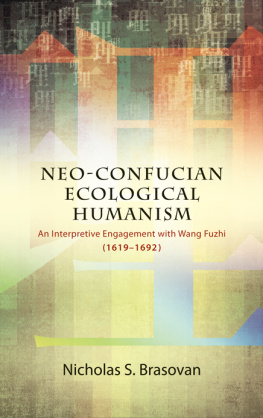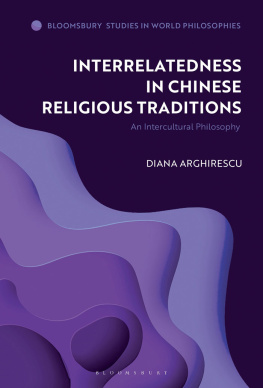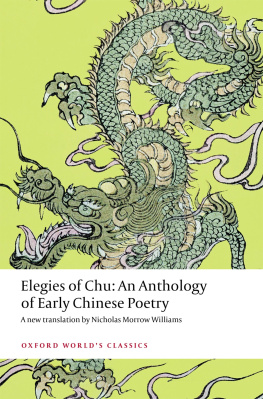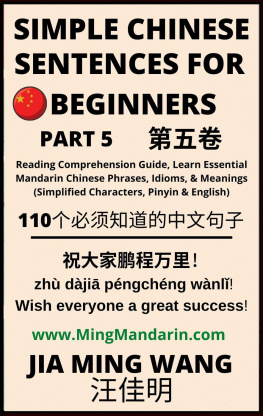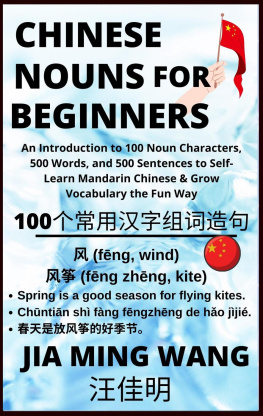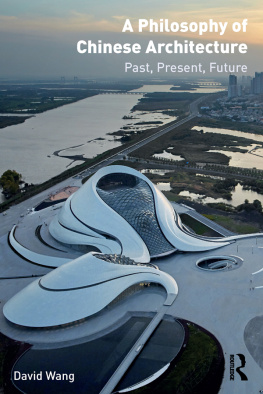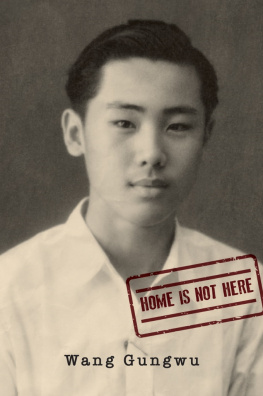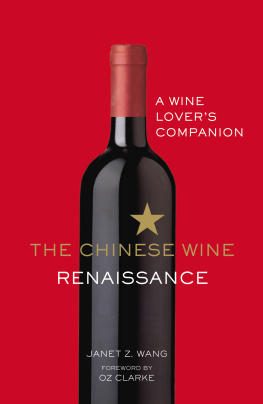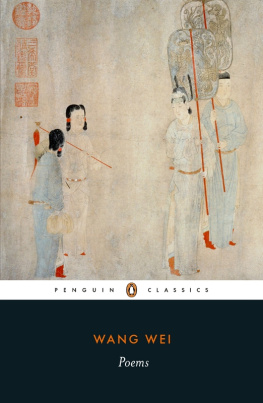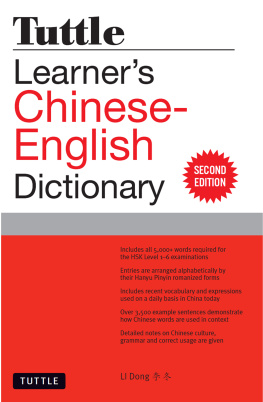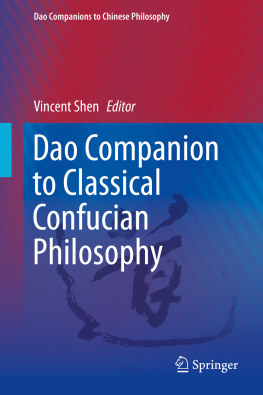NEO-CONFUCIAN
ECOLOGICAL
HUMANISM
A volume in the SUNY series in Chinese Philosophy and Culture
Roger T. Ames, editor
NEO-CONFUCIAN
ECOLOGICAL
HUMANISM
An Interpretive Engagement with Wang Fuzhi
(16191692)
Nicholas S. Brasovan
Published by State University of New York Press, Albany
2017 State University of New York
All rights reserved
Printed in the United States of America
No part of this book may be used or reproduced in any manner whatsoever without written permission. No part of this book may be stored in a retrieval system or transmitted in any form or by any means including electronic, electrostatic, magnetic tape, mechanical, photocopying, recording, or otherwise without the prior permission in writing of the publisher.
For information, contact State University of New York Press, Albany, NY
www.sunypress.edu
Production, Diane Ganeles
Marketing, Anne M. Valentine
Library of Congress Cataloging-in-Publication Data
Names: Brasovan, Nicholas S., 1979 author.
Title: Neo-Confucian ecological humanism : an interpretive engagement with Wang Fuzhi (16191692) / by Nicholas S. Brasovan.
Description: Albany, NY : State University of New York, 2017. | Series: SUNY series in Chinese philosophy and culture | Includes bibliographical references and index.
Identifiers: LCCN 2016031417 (print) | LCCN 2017009866 (ebook) | ISBN 9781438464534 (hardcover : alk. paper) | ISBN 9781438464558 (ebook)
Subjects: LCSH: Wang, Fuzhi, 1619-1692. | Neo-Confucianism. | Humanism. | Philosophy of nature.
Classification: LCC B5234.W334 B73 2017 (print) | LCC B5234.W334 (ebook) | DDC 181/.112dc23
LC record available at https://lccn.loc.gov/2016031417
10 9 8 7 6 5 4 3 2 1
To Amy, Sage, and Alethea
Contents
Acknowledgments
This study is a consummation of research that I began as a PhD candidate in the Department of Philosophy at the University of Hawaii. I am infinitely indebted to my teachers, Roger T. Ames and Chung-ying Cheng, for their extensive and intensive lessons on Confucianism, Daoism, and neo-Confucianism. I am indebted to Ron Bontekoe for his seminars on radical empiricism and philosophical hermeneutics, Steve Odin for his seminars on radical empiricism and process philosophy, and David McCraw at the University of Hawaii, Department of East Asian Languages and Literatures, for his expert lessons on classical Chinese language and culture. I am thankful to Shana Brown at the University of Hawaii, Department of History, for her critical advice to contextualize this philosophical study with a biographical introduction to Wang Fuzhi. Thank you to all of these scholars for their critique of early iterations of this work. I am also grateful to Mary Tiles for her seminar on the philosophy of ecology at the University of Hawaii, which introduced me to the paradigm of ecological humanism.
I am grateful to my colleagues, Clayton Crockett and Taine Duncan, for their instructive discussions on new materialism. Indeed, their scholarship and arguments have persuaded me to change my original position on this interpretive engagement between materialism and neo-Confucian cosmology. I am particularly indebted to Taine Duncan for sharing her expertise on this topic in our collaborative work, Contemporary Ecofeminism and Confucian Cosmology, in Feminist Encounters with Confucius (Leiden: Brill Academic Publishers, 2016). I have reworked my discussion of new materialism here based on the resources and arguments that Duncan and I worked through in our co-authored work.
Thank you to the excellent editors at SUNY Press, Nancy Ellegate, James Peltz, Christopher Ahn, Jessica Kirschner, and Diane Ganeles, for facilitating the editing and publication of this work. I am fortunate to have had the opportunity to work with Nancy Ellegate in the early phases of acquisition and editing of this book. Her vision and effort as the acquisitions editor at SUNY Press played a key role in bringing this work to press. Nancys work has been essential to a wealth of resources on Asian philosophies published by SUNY Press. Her legacy lives on here and throughout the field of Asian studies. She will be missed by authors and readers alike.
Thank you to the University of Central Arkansas, University Research Council, for support of this research project. Finally, portions of my discussion of modernity and methodology here are iterated in a prefatory article, Considerations for a Confucian Ecological Humanism, in Philosophy East and West, vol. 16.1 (University of Hawaii Press, July 2016, pp. 842860). Thank you to the editors at Philosophy East and West and the University of Hawaii Press for permissions to reprint portions of that article here.
| ZYW | Zhouyi waizhuan (1655) |
| DSS | Du Sishudaquan shuo (revised 1665) |
| ZYXJ | Zhouyi daxiang jie (1676) |
| ZMZ | Zhangzi Zhengmeng zhu (1679) |
| SWW | Siwenlu waipian (c. 1680) |
| ZYBS | Zhouyi baishu |
| ZYFL | Zhouyi neizhuan fali (1686) |
| ZYN | Zhouyi neizhuan (1686) |
| SYY | Shangshu yinyi (revised 1689) |
| SL | Songlun (1691) |
for further details. I follow the conventions for abbreviating Wangs titles as outlined by Jacques Gernets list, Ouvrages de Wang Fuzhi (2005, 11).
One yin one yang is called dao ; continuing it is efficacious; developing it is a natural disposition. Humane persons see it and call it humane; knowledgeable persons see it and call it knowing. Everyday novelty is called flourishing excellence. Procreative creativity is called change. Continuous transformation is called an event. Yinyang , unfathomable, is called sublime.
Book of Changes, Appended Phrases , Upper Division, 5.1
Introduction
Thesis
To be a person is to be a person-in-the-world. In this project I aim to analyze and amplify this slogan, and present the concept person-in-the-world as a model for ecological humanism. I use the term ecological humanism in the sense that it is used in Kerry Whitesides (2002) work in philosophy of ecology, Divided Natures: French Contributions to Political Ecology . As Whiteside defines it, ecological humanism is a theoretical paradigm based on the belief that persons and the natural world are inextricably interrelated events. The concepts of nature and humanity are bound together in historical-cultural processes, such that what nature is can be understood only in relation to human practices, hopes, and fearsand vice versa (Whiteside 73). In this view, nature has no essence in itself; likewise, persons have no essence apart from the environments that they inhabit. The thesis of ecological humanism rejects any mode of thought that dualistically distinguishes persons from their natural and social environments. In this vein I propose person-in-the-world as a synthetic concept that draws together the concepts of persons and environing world. I use the term person-in-the-world to denote complex systems of interactive, causally efficacious, relationships that bind persons and the environing world. In short, a person-in-the-world is a complex system. The concept is unavoidably ecological. A person-in-the-world is a nested hierarchical structure. At the basic level, the nested hierarchical structure of a person-in-the-world consists of a complex, thinking-and-feeling, organism situated within a complex environmental ecosystem. With regard to the presence of a heart-and-mind (Chinese, xin ) within persons-in-the-world, I advance that a neo-Confucian model of persons-in-the-world is neither a materialism nor idealism in the traditional senses of the term. The present model of philosophy is thoroughly non-dualistic in the sense that it precludes person/nature dichotomies as well as matter/consciousness dualisms.

